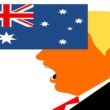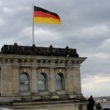I recently excavated a British newspaper picture of me in a phalanx of demonstrators charging the American Embassy in London in 1969 to protest the war in Vietnam. People in Britain were angry about the war even without the goad of possible conscription and deployment, and the protest came very close to breaking the police line to confront the Marine guards. It was possibly the genesis of “Street Fighting Man”: while tipping coppers’ helmets forward over their eyes I looked around and saw Mick Jagger was shoulder to shoulder with me.
From the safe distance of decades, it is still chilling to consider what could have happened if we had confronted the Marines head-on, but in any case Labour Prime Minister Harold Wilson knew which way the wind was blowing and resisted LBJ’s famously vigorous pressures to join in the war. Wilson never got the credit he deserved, not least from Christopher Hitchens who continued to vilify the deceased prime minister for opposing the Vietnam War with insufficient zeal, even as he lionized Tony Blair and George Bush for engineering the second most disastrous war in American history.
So the photo made it seem timely to accept an invitation to work with a friend on a book project for a short while at his place in the Mekong Delta, where I arrived a few weeks before Ken Burns and Lynn Novick’s documentary aired on American television. The experience made me think about the actual results of our “Victory to the Vietcong” slogans. After the initial days, the purges were less ruthless than one might have feared, but Vietnam never had the romantic allure of Castro’s Cuba.
Ho Chi Minh had the politeness to take his bow before victory and so never had to bear responsibility for the ethnic cleansing of the Chinese boat people. Regrettably few of us concerned ourselves with events between the exodus of the helicopters from the embassy and the involuntary embarkation of the boat people, one of the most overlooked mass expulsions of the era.
That amnesia contrasted almost favorably with the U.S. flagstaffs flying the POW/MIA flag, fostering the dark legend that thousands of innocent G.I.s have languished in fiendish dungeons across Indochina and fueling the persecution of American politicians who dared to tell the truth about the inhumanity and insanity of the war.
But in Vietnam itself, there are few visible signs of rancor about the two million dead and missing from one of the most pointless exercises in mayhem in modern history. Making the contrast even stronger, death is, in its way, ubiquitous across the Delta. I leave it to agriculturists to judge whether the random scattering of ancestral tombs in family paddy fields enhances or inhibits productivity. My hosts still maintained the cluster of tombstones next to my bedroom door, even though their occupants predated the family’s ownership of the land.
To get to my riverbank lodge, after the boat up the river, I rode perched like a blimp on the back of a moped taxi for the final lap. It was like a flashback to the Ho Chi Minh trail, where the eventually victorious Vietcong wielded endless convoys of bicycles against the mechanized might of Uncle Sam.
Everything in the district went on two wheels, from four protesting pigs consigned to the market by the next-door neighbor, to the marquee and tables for my host’s one-year-old’s birthday party. The bikes carried luggage, crates of Saigon beer, and cases of Hanoi vodka, all shaken and stirred by the trek along rutted paths and over perilously narrow humpback bridges. In the absence of roads, paths barely wide enough for two bikes to pass each other on were the capillaries to the riverine trade artery and floating market.
In between deliveries of household essentials, the local party official rode around hoisting the national flag with its gold star at regular intervals along the paths which, in a way, provided their own flashback. As the marquee was assembled, the floor next to my desk was being laid out with a banquet for the ancestral ghosts, in case they wanted to join the fun. They did not turn up. But I hope Ho Chi Minh had a nibble: one of the functions of the functionary was to ensure that each house had a prominent icon of Uncle Ho along with the ancestors and incense sticks!
But there were other absent deceased. My hosts mentioned a family member who had missed the helicopter out of Saigon—and who was saved by the local party official who had won her position due to her role as a Mama-san whose girls collected information for the Vietcong from the G.I.s during the war. It was casually remarked that when the Americans went, less well-connected people were shot and dumped in the nearby Mekong so they would not rest for eternity, but family connections still counted!
This extended family was a collective matriarchy of sisters, cousins, and aunts, many of whom had made their modest fortunes working in the entertainment industry in Saigon’s District One. My arrival put them into immediate plenary session with an agenda that combined the Kama Sutra with Jane Austen. “It is a truth universally acknowledged, that a single man in possession of a good fortune, must be in want of a wife”–or two. Did I want a wife (or two) for the duration of my stay, for longer, for Vietnam, or to take home? They weighed and offered the options. Good-looking, not too young, good sex was axiomatic, but “good heart” was also crucial. Playing along, I suggested intelligence and intellect. They were still guffawing about the latter request when I left.
Saturday, September 2 is Vietnam’s National Day, when Ho Chi Minh declared independence from France in 1945. The Women’s Committee decided to take us to the fount of their fortune in District One of Saigon, Ho Chi Minh City. We threaded through streets festooned with the national flags and the party’s hammer and sickle flags, past the beckoning masseuses politely ambushing us from the storefronts, to the Apocalypse Now nightclub, the city’s oldest. No one I spoke to could pronounce it, let alone connect it to the film that epitomized the irrational bloodbath that the war had become.
In the club, Yuri the female D.J. was like an avatar of the goddess Kali, her arms jerking in the strobes against the psychedelic light-show backdrop. She was mixing House to a throbbing, scantily but very tastefully dressed crowd with little thought to Uncle Ho—and the disco was sponsored by Budweiser, surely up there with napalm as one of the least desirable U.S. exports. Known unkindly as “the meat market,” the club hosted women who were unashamedly after our dongs. For the lubriciously minded, there are a couple of million dongs to the dollar.
Did we really risk our careers and freedom in Grosvenor Square to bring Bud—I suppose it is made with rice—to Ho Chi Minh City? Decades on, socialism equals sex for sale plus party power?
But to be fair, the country has high-speed internet in the Delta and electrification in the villages, and every day the kids cycle to school in their neat uniforms. There is a functioning health service and there are no overt signs of abject poverty or crime in the streets, which are clean and well-signed, and there is a thriving commerce, including all common international brands—including, of course, the world’s worst beer.
But the children of the cadres, mostly transplanted from the North, who had fought the 30-year war to force out the Japanese, the British, the French, and the Americans, were dancing with the foreigners in the nightclubs and thronging the hotels and restaurants of downtown Saigon, and they own the companies that import all those decadent foreign commodities. While commerce and sex are uninhibited, though, Vietnam is under tight political control. It is no socialist paradise, but nor is it an open prison. It is almost a Singapore with paddy fields and not a hint of a Marshall Plan from the country so eager to spend a fortune to obliterate it.
Born in Liverpool, UK, Ian Williams organized a sit-in at the city’s U.S. consulate there for the first moratorium day, and so was rather surprised to be let into the U.S. when he moved here in 1989. His latest books are UNtold: the Real Story of the UN, and Political & Cultural Perceptions of George Orwell. He writes about diplomacy and politics, with a sideline in the histories of liquors like rum and tequila. He won the Liverpool Press Club award for byline mania in 1987 for his centerfold in the Baptist Times, and has since written for many more respectable publications such as this.




0 Comments